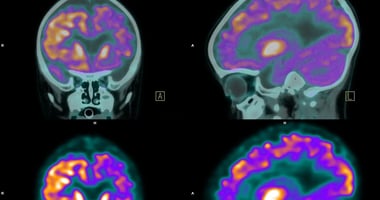African-American individuals on average have lower levels of the tau protein compared with white...
Amyloid and Anxiety May Speed Cognitive Decline in Preclinical Alzheimer's, Study Suggests
 |
To evaluate the association between Aβ status and cognitive changes, and the role of anxiety and depressive symptoms in moderating Aβ-related cognitive changes in the preclinical phase of AD, researchers at multiple institutions studied 333 healthy older adults at hospital-based research clinics. They measured levels of Aβ in the brain at baseline, and 18-, 36-, and 54-month follow-up assessments. They also used Hospital Anxiety and Depression Scale scores and comprehensive neuropsychological evaluations to measure global cognition, verbal memory, visual memory, attention, language, executive function, and visual-spatial ability.
They found that a positive Aβ (Aβ+) status at baseline was associated with a significant decline in global cognition, verbal memory, language, and executive function. Further, the researchers found that compared with the Aβ+, low-anxiety group, slopes of cognitive decline were significantly more pronounced in the Aβ+, high-anxiety group.
“These results provide additional support for the deleterious effect of elevated Aβ levels on cognitive function in preclinical AD,” the authors stated. “They further suggest that elevated anxiety symptoms moderate the effect of Aβ on cognitive decline in preclinical AD, resulting in more rapid decline in several cognitive domains. Given that there is currently no standard anti-amyloid therapy and that anxiety symptoms are amenable to treatment, these findings may help inform risk stratification and management of the preclinical phase of AD.”
For more information on Alzheimer's research, see the Psychiatric News article, "Imaging Uncovers Brain Changes Long Before Alzheimer's Diagnosis."
(Image: Mopic/shutterstock.com)





